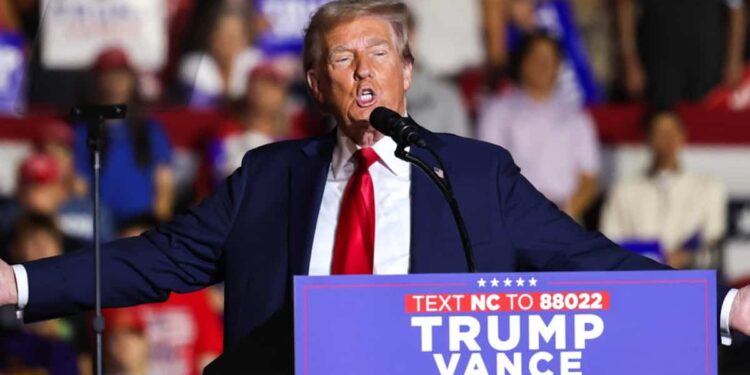Disappointed by Democrats on economic and migration issues, more and more Latin Americans like Maria Salinas say they will vote for Donald Trump in the presidential election, support that could be crucial for him.
• Also read – Arnold Palmer’s genitals: electoral strategy or impulsive statements?
• Also read – 15 days before the presidential election, race tighter than ever between Harris and Trump
• Also read – Presidential: seven key states to watch
“Trump can change things a little,” assures this woman who runs a stand at a flea market north of Las Vegas, in Nevada, one of the decisive states for November 5.
“I have family members who have been waiting for years for a way to regularize their situation and nothing but promises and promises. (The Democrats) make nice speeches, but nothing changes for us,” exclaims this 56-year-old trader.
And to assure about the Republican: “This time, I am going to give him my vote to see if he can help us.”
AFP
In this maze of colorful stalls, many members of the Latino community blame Democrats for the rising cost of living and migration policies.
Although it continues to lean towards the Democratic Party overall, the Latino vote has been eroded by the Republicans for several years.
In 2012, 71% of Latin Americans voted Democratic and 27% Republican. In 2020, it was only 66%, with Donald Trump obtaining 32% of the vote.
And according to a recent UnidosUS poll, 57% of Latinos today lean for Democrat Kamala Harris, compared to 34% for Trump.
A decline which could weigh heavily, particularly in Nevada where this community represents a fifth of the electorate and where the vote promises to be extremely close, with the polls giving Harris barely a half-point lead.
“Very angry”
“I have never understood why they say that Latinos must be Democrats,” says Javier Barajas, restaurant owner in Las Vegas.
“The Democrats never helped us,” accuses this sixty-year-old who crossed the border between the United States and Mexico in the 1970s.
He had already voted in 2020 for Donald Trump. But it is only today that he says he declares himself openly Republican.
“Now, yes, I say it, because I am very angry with the Democrats (…). It’s a way of telling them: “OK, that’s enough. We don’t agree with you, you need to take us more seriously.”
Javier Barajas, for example, praises former Republican President Ronald Reagan who allowed the regularization of several million immigrants in 1986. According to him, the promises of “mass expulsions” made by Donald Trump will only concern “delinquents”: “He will not attack workers”.
He assures that he does not take personally the vehement remarks of the Republican candidate against migrants but claims to have warned the former president, who visited his restaurant, like Joe Biden, that many Latinos hated this rhetoric.
According to a survey New York Times/Siena College realized in early October, most Latin Americans do not feel concerned when Donald Trump accuses migrants of being criminals and of “poisoning the blood” of the country.
“Immigrant like us”
However, the candidacy of Kamala Harris has reshuffled the cards and could help the Democrats to halt Trump’s progress.
MEGA/WENN
“Although she is not Latina, she is an immigrant like us. She experienced the same situations of discrimination,” points out Reina Velis, 62 years old.
The candidate “is the product of immigrant parents,” adds Ricardo Fernandez, 54, in reference to the Indian and Jamaican parents of the vice-president.
For this businessman, who emigrated from Mexico more than forty years ago, the Democratic Party “is more in line with our ideas and our way of being,” but should do more to speak to Latinos. Americans.
According to him, support for the billionaire – despite his violent anti-immigration rhetoric – is explained by the fact that “many Latinos are not well informed”.
“It is very important for the community to pay attention to what is happening here,” he insists. “We are talking about a candidate who says she wants to help the middle class and a candidate (…) whose plan is to favor billionaires and millionaires.”
However, he emphasizes, “how many Latinos are millionaires in the United States?”



